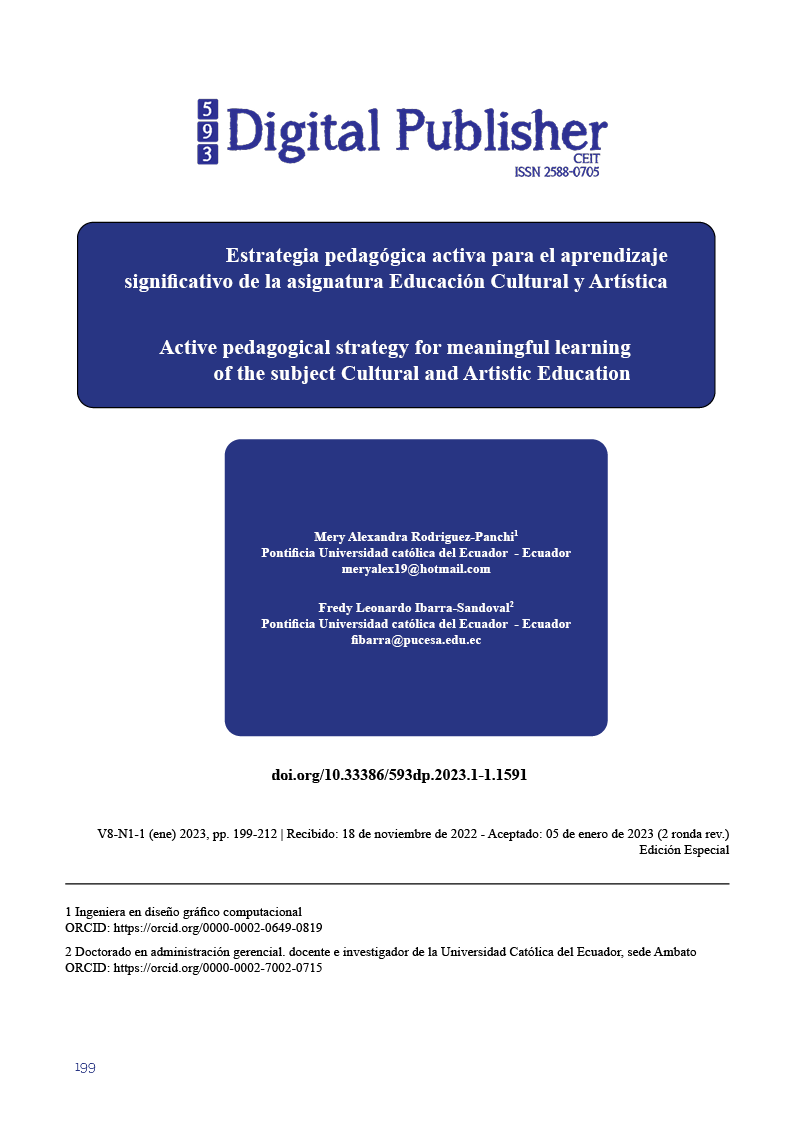Active pedagogical strategy for meaningful learning of the subject cultural and artistic education
Main Article Content
Abstract
As technology advances, the world becomes more demanding revealing new needs, even more if they are about education, where it is important to be updated to strengthen the teaching learning process which starts in a classroom through pedagogical strategies applied by teachers. In such way, the educative process has constant challenges that look for innovative solutions, for this reason teachers must acquire new knowledge and domains about the best strategies to achieve the students’ interest in order to reach meaningful learning for life. The objective of this research is to implement an active pedagogical strategy based on the web tool “Google Sities” for the development of significant knowledge of superior basic general education students. This research was developed with a quantitative approach of quasi-experimental type with the survey technique. Briefly, this research is focused on the contribution in the teaching learning process to achieve an educational management of quality and warmth.
Downloads
Article Details

This work is licensed under a Creative Commons Attribution-NonCommercial-ShareAlike 4.0 International License.
1. Derechos de autor
Las obras que se publican en 593 Digital Publisher CEIT están sujetas a los siguientes términos:
1.1. 593 Digital Publisher CEIT, conserva los derechos patrimoniales (copyright) de las obras publicadas, favorece y permite la reutilización de las mismas bajo la licencia Licencia Creative Commons 4.0 de Reconocimiento-NoComercial-CompartirIgual 4.0, por lo cual se pueden copiar, usar, difundir, transmitir y exponer públicamente, siempre que:
1.1.a. Se cite la autoría y fuente original de su publicación (revista, editorial, URL).
1.1.b. No se usen para fines comerciales u onerosos.
1.1.c. Se mencione la existencia y especificaciones de esta licencia de uso.
References
Alvarado Hinostroza, E. F., & Tolentino Quiñones, H. (2021). Teaching and learning in distance education in Basic Education through virtual platatforms. 593 Digital Publisher, 155-165. https://doi.org/10.33386/593dp.2021.4-1.679
Arango Llanos, C. A., Moreno, H., & Parra Bustos, I. (2015). LA TUTORIA COMO ESTRATEGIA PEDAGOGICA EN LAS PRÁCTICAS. Tesis de maestria en Ciencias de la Educación. Bogota, Colombia. file:///C:/Users/Personal.DESKTOP-MMIMU2G/Desktop/respaldos/Escritorio/Escritorio/REFERENCIAS/tutoria%20en%20las%20practicas%20educativas.pdf
Arévalo Salazar, K. M., & Mendoza Cuenca, J. C. (2017). Estrategias metodológicas en el desempeño escolar. Universidad de Guayaquil. Facultad de Filosofiía, Letras y Ciencias de la Educación. Tesis. http://repositorio.ug.edu.ec/bitstream/redug/28450/1/BFILO-PD-LP10-13-004.pdf
Arias Hurtado, A. M., & Henao Isaza, S. L. (2020). Consolidación de un google–sites, como estrategia mediada por las tics para el abordaje de la educación ambiental. Estudio de caso. Pereira. https://repositorio.utp.edu.co/items/b1723f8c-8c99-49be-81cb-22b2610e949b
Ausubel, D. (1983). Teoría del aprendizaje significativo. Fascículos de CEIF 1-10. https://d1wqtxts1xzle7.cloudfront.net/36648472/Aprendizaje_significativo-with-cover-page-v2.pdf?Expires=1654045150&Signature=AHIbdtxGBhxAtL4LmWyiNWrabpSidgzczZs9WsIpt3ZC0jvG1pJ7Z6hVHc3ot-lpyUipa68W2SB7kUuwLtIP5tUNUXUic3AkZTZwlwSzyOpJ0~S9TP2xpsR~yfg9R-a7LX
Azorín, C. (2020). Beyond COVID-19 supernova. Is another education coming? Revista de Capital Profesional y Comunidad, 5, 381-390. https://doi.org/10.1108/JPCC-05-2020-0019
Baque Reyes, G., & Portilla Faican, G. (Mayo de 2021). El aprendizaje significativo como estrategia didáctica para la enseñanza–aprendizaje. Polo del conocimiento, 6(5), 75-86. http://repositoriobibliotecas.uv.cl/handle/uvscl/2030
Cabero Almenara, J., & Palacios Rodríguez, A. (2021). La evaluación de la educación virtual: las e-actividades. Revista Iberoamericana de Educación a Distancia, vol. 24, 169-182. https://www.redalyc.org/journal/3314/331466109010/331466109010.pdf
Carrillo Flores, A. L. (Septiembre de 2015). Población y muestra. Métodos de investigación : http://ri.uaemex.mx/oca/view/20.500.11799/35134/1/secme-21544.pdf
Chura, L. E. (16 de abril de 2019). Bases epistemológicas que sustentan la teoría de las inteligencias múltiples de Howard Gardner en la pedagogía. 1-68. Puno, Perú: Universidad Central del Antiplano/ Escuela de Posgrado/Maestria en Educación. http://repositorio.unap.edu.pe/handle/UNAP/10548
Gagliardi, V. (2020). Desafíos educativos en tiempos de pandemia. Questión. http://sedici.unlp.edu.ar/bitstream/handle/10915/99685/Documento_completo.pdf-PDFA.pdf?sequence=1&isAllowed=y
Grand Clement, S. (2017). Digital learning Education and skills in the digital age. RAND Europa, 23. https://eric.ed.gov/?id=ED591364
Guananga, M., & Yugcha, G. (Septiembre de 2020). Las TIC y su incidencia en la innovacion docente. Latacunga, Cotopaxi, Ecuador. http://repositorio.utc.edu.ec/bitstream/27000/7179/1/T-001620.pdf
Hernández Sampieri, R. (2018). Metodología de la investigación: las rutas cuantitativa, cualitativa y mixta. McGraw Hill México. file:///C:/Users/Personal.DESKTOP-MMIMU2G/Downloads/Metodologia%20de%20la%20investigacion%20manual%20para%20el%20desarrollo%20de%20personal%20de%20salud%2035.pdf
INEC. (2021). Programa Nacional de Estadística y Censos 2021-2025 Educación en el Ecuador Resultados de PISA para el desarrollo. Quito-Ecuador. https://www.evaluacion.gob.ec/wp-content/uploads/downloads/2018/12/CIE_InformeGeneralPISA18_20181123.pdf
Lascano Dueñas, D. J. (2019). Estrategia pedagógica activa para el aprendizaje significativo de lengua y literaturaen educación básica. Ambato, Ambato, Ecuador. https://repositorio.pucesa.edu.ec/bitstream/123456789/2928/1/77094.pdf
Lazaro, C. (25 de 06 de 2020). Neurodidáctica:Motivacion. Mexico. https://www.youtube.com/watch?v=EIrvTLHx3J8
Mendivelso, F., & Rodriguez, M. (2018). Prueba Chi-Cuadrado de independencia aplicada a tablas 2xN. Revista Médica Sanitas, 21(2), 92-95. https://www.researchgate.net/profile/Fredy-Mendivelso/publication/327733869_Prueba_Chi-Cuadrado_de_independencia_aplicada_a_tablas_2xN/links/5d154deaa6fdcc2462ab4920/Prueba-Chi-Cuadrado-de-independencia-aplicada-a-tablas-2xN.pdf
MINEDUC. (Marzo de 2020). ACUERDO Nro. MINEDUC-MINEDUC-2020-00020-A. Suspención de clases en todo el territorio nacional. https://educacion.gob.ec/wp-content/uploads/downloads/2020/04/MINEDUC-MINEDUC-2020-00020-A.pdf
Mousalli Kayat, G. (2015). Métodos y diseños de investigación cuantitativa. Revista researchgate, 39. https://www. researchgate. net/publication/303895876_Metodos_y_Disenos_de_Investigacion_Cuantitativa.
Muñoz Moreno, J., & Molins, L. (2020). Educación y Covid-19: Colaboración de las familias y tareas escolares. Revista Internacional de Educación para la Justicia Social, 9. https://revistas.uam.es/riejs/article/download/12182/12058/
Paredes Chacín, A. J., Inciarte González, A., & Walles Peñaloza, D. (2020). Educación superior e investigación en Latinoamérica. Transición al uso de tecnologías digitales por Covid-19, 26(3), 98-117. https://dialnet.unirioja.es/servlet/articulo?codigo=7565470
Pérez Matar, R., & Paredes Esponda, E. (2019). Una mirada a la historia y los servicios de Google. Revista de Información para la Dirección en Salud (INFODIR), 15(30), 1-11. https://www.medigraphic.com/pdfs/infodir/ifd-2019/ifd1930f.pdf
Pérez, E. R., & Medrano, L. (2010). Análisis Factorial Exploratorio: Bases Conceptuales y Metodológicas. Revista Argentina de Ciencias del Comportamiento, Vol. 2, N°1, 58-66. https://dialnet.unirioja.es/servlet/articulo?codigo=3161108
Prensky, M., & González Calatayud, V. (2018). Entrevista a Marc Prensky. RIITE Revista Interuniversitaria de Investigación en Tecnología Educativa, 5, 12-21. https://revistas.um.es/riite/article/view/354791
Recio Mayorga, J., Prudencia Gutiérrez, E., & Suárez Guerrero, C. (2021). Recursos educativos abiertos en comunidades virtuales docentes. Apertura, 13(1), 101-117. http://www.scielo.org.mx/scielo.php?pid=S1665-61802021000100101&script=sci_arttext
Rodríguez Palmero, M. L. (2011). La teoría del aprendizaje significativo: una revisión aplicable a la escuela actual. Revista Electrònica de Investigación Innovació Educativa Socioeducativa, 29-50. http://www.in.uib.cat/pags/volumenes/vol3_num1/rodriguez/index.html en (poner fecha)”
Romero Pérez, J., & Lavigne Cerván, R. (2005). Dificultades en el Aprendizaje: Definición,caracteristicas y tipos. TECNOGRAPHIC, S.L. https://www.uma.es/media/files/LIBRO_I.pdf
Sadaf, S. (2016). Use of digital technologies in education. The complexity of teachers’ everyday practice. Prensa de la Universidad de Linneo. https://www.diva-portal.org/smash/record.jsf?pid=diva2%3A1039657&dswid=6675
Sanders, K., Boustedt, J., Eckerda, A., McCartney, R., & Zander, C. (2017). Folk Pedagogy: Nobody Doesn’t Like Active Learning. Teacher Conception and Experience, 145–154. https://doi.org/10.1145/3105726.3106192
Thomas, O., Simpun, S., & Yulinda, Y. (2022). The Effect of Using Google Sites as Learning Sources on Learning Outcomes of Students at SMK Negeri 4 Palangka Raya Academic Year 2021/2022. Budapest International Research and Critics in Linguistics and Education, 91-102. https://www.bircu-journal.com/index.php/birle/article/view/4231
UNESCO. (2021). Respuesta de la UNESCO a la crisis mundial de la educación provocada por la COVID-19. Unesdoc Biblioteca Digital: https://unesdoc.unesco.org/ark:/48223/pf0000381065_spa
Ventura León, J. L., Arancibia, M., & Madrid, E. (2017). La importancia de reportar la validez y confiabilidad en los instrumentos de medición. Revista médica de Chile, 145(7), 955-956. https://dx.doi.org/10.4067/s0034-98872017000700955
Videla, C., Vázquez-Cano, E., López-Meneses, E., & Orrego, R. (2021). Proyecto DIFPRORET: análisis de las dificultades, propuestas y retos educativos ante el covid-19. IJERI: International journal of educational research and innovation, 17-34. https://www.upo.es/revistas/index.php/IJERI/article/view/5145/4527



